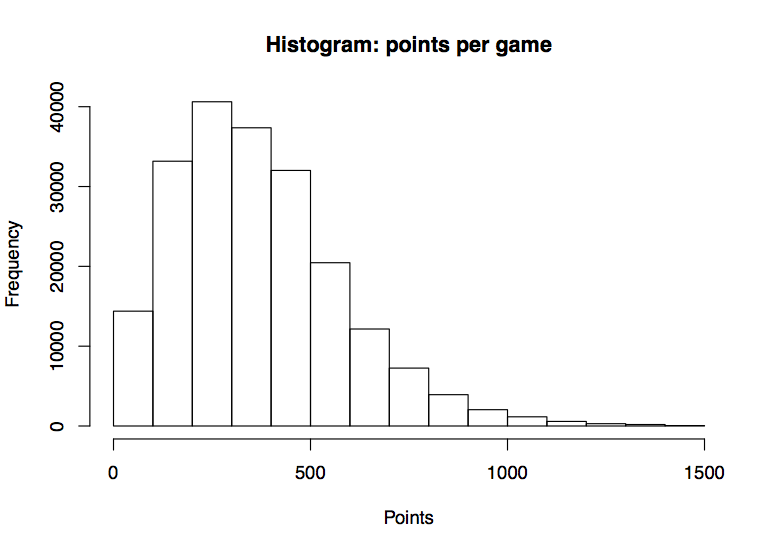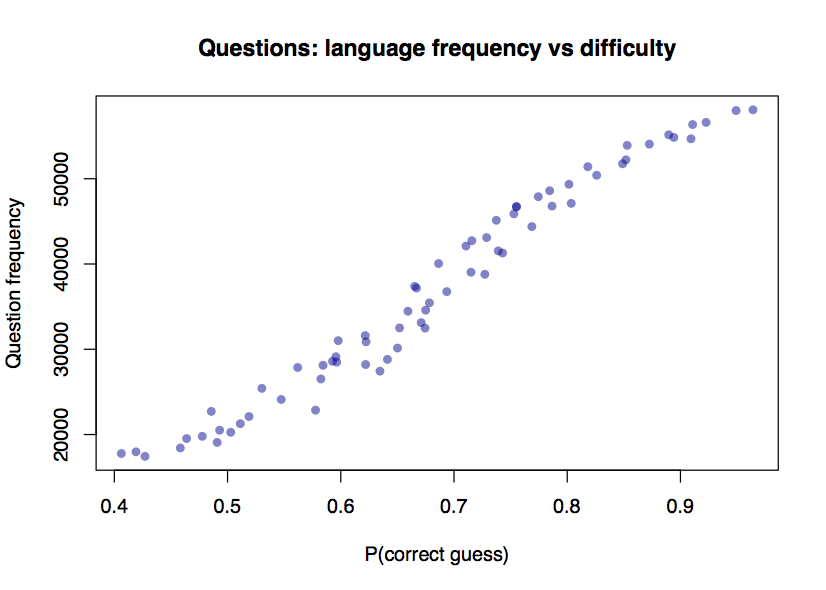It was just a week ago that I introduced the Great Language Game. Now, some 160,000 people have tried the game, playing some 360,000 games. What an amazing response! As a result, my inbox has been filled with your awesome suggestions, and I've been busy making them happen.
Today's update
Whilst I haven't been able to address all the feedback, today's update is jam packed. It brings:
- 10 new languages: Basque, Hausa, Icelandic, Northern Ndebele, Northern Sami, Scottish Gaelic, Shona, South Efate, Tibetan, Welsh
- Improved samples for Korean, Italian, Portuguese and Slovak
- A total of 5 samples per language (up from 3)
Some stats
Now many of you have been telling me, the stats page is a little paltry given all the awesome data that's being collected. I hear you, and until I can improve it, here's some numbers to whet your appetite.
Points
In the current game, you get 50 points for each correct answer. Here's a histogram of how the the points are distributed across all the games so far:

The median score was 350 points, with the mean a little higher at 393.5. Wondering where you fit in this distribution? Well, a score of:
- < 350 means it's early days, keep practicing!
- >= 350 puts you in the top 50%
- >= 500 the top 25%
- >= 700 the top 10%
- >= 800 the top 5%
- >= 900 the top 2.5%
- >= 1050 the top 1%
A number of you made it even higher, beyond even 1,500 in score. Make no mistake, you've achieved something amazing. Try again now that we have more languages and samples -- you'll find something fresh in the game for you now.
Difficulty ramp
There's two difficulty measures built into the game, meant to make it kinder to begin with and harder as you go. The first: every time you get three answers correct, another option is added for every question. The second: highly mistaken languages are weighted to occur more frequently in late game, and easier languages more frequently in early game.
Let's see roughly how this has played out in practice:

The graph shows the ramp is working: easier languages made it into more questions, and harder languages into fewer. Over time, I'll have to ensure "harder" languages aren't overly penalized for appearing more in the difficult late-game. I'll be keeping an eye on this distribution over time, especially as new languages are introduced.
The easiest four languages turn out to all be well-known international languages: French, German, Italian and Spanish. The hardest in our set? Kannada, Fijian, Dinka and Dari.
Wrapping up
The language game is already fun, but today's update makes it even better. Hopefully these stats help you to interpret how you're doing relative to other people, and also give you an idea of what's possible with a little practice. For me personally, this weekend has allowed me to build better infrastructure and faster curation tools. This means more great features still to come.
Until next time, all the best and happy listening!